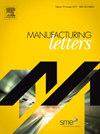Framework for LLM applications in manufacturing
IF 1.9
Q3 ENGINEERING, MANUFACTURING
引用次数: 0
Abstract
In the era of Industry 4.0, the proliferation of data within manufacturing environments has presented both unprecedented opportunities and challenges. This paper introduces a framework that capitalizes on the capabilities of Large Language Models (LLMs) to revolutionize data integration and decision-making processes in manufacturing systems. Addressing the critical need for efficient data management, our framework streamlines the consolidation, processing, and generation of responses to essential inquiries, thus enhancing manufacturers’ capabilities to extract valuable insights. The focus of this paper is twofold. First to establish a framework for the use of LLM applications in manufacturing settings. Secondly, to provide an overview of the manufacturing connection between data, AI, and chat-bots, while also addressing a few pain points identified from the manufacturing literature. The paper then introduces FILLIS (Factory Integrated Logic and Language Interface System), a Large Language Model assistant, through a compelling case study. FILLIS showcases remarkable versatility, excelling in tasks ranging from elucidating machine operations to language translation. The study underscores FILLIS’s proficiency in handling specific contexts, answering questions from uploaded documents with precision. However, inherent limitations surface in tasks involving mathematical operations, emphasizing the need for external agents in specific scenarios. This pivotal opportunity is explored in the proposed framework as it advocates for integrating external agents alongside LLMs, creating a more versatile and comprehensive assistant tool. The findings of this paper and proposed framework position LLMs as transformative tools for intelligent data processing.
制造业应用 LLM 的框架
在工业 4.0 时代,制造环境中数据的激增带来了前所未有的机遇和挑战。本文介绍了一种利用大型语言模型(LLM)功能的框架,以彻底改变制造系统中的数据集成和决策流程。为了满足高效数据管理的关键需求,我们的框架简化了重要查询的整合、处理和生成响应,从而提高了制造商提取有价值见解的能力。本文的重点有两个方面。首先,为在制造环境中使用 LLM 应用程序建立一个框架。其次,概述数据、人工智能和聊天机器人之间的制造业联系,同时解决从制造业文献中发现的几个痛点。然后,本文通过一个引人注目的案例研究介绍了大型语言模型助手 FILLIS(工厂集成逻辑和语言接口系统)。FILLIS 展示了非凡的多功能性,在阐释机器操作和语言翻译等任务中表现出色。这项研究强调了 FILLIS 在处理特定语境方面的能力,它能准确回答上传文档中的问题。然而,在涉及数学运算的任务中,其固有的局限性就显现出来了,这就强调了在特定场景中对外部代理的需求。本文提出的框架探讨了这一关键机遇,主张将外部代理与 LLMs 整合在一起,创建一个功能更全面、更综合的辅助工具。本文的研究结果和拟议框架将 LLMs 定位为智能数据处理的变革性工具。
本文章由计算机程序翻译,如有差异,请以英文原文为准。
求助全文
约1分钟内获得全文
求助全文
来源期刊

Manufacturing Letters
Engineering-Industrial and Manufacturing Engineering
CiteScore
4.20
自引率
5.10%
发文量
192
审稿时长
60 days
 求助内容:
求助内容: 应助结果提醒方式:
应助结果提醒方式:


